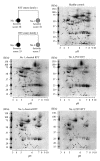A plasma proteomic approach in Rett syndrome: classical versus preserved speech variant
- PMID: 24453418
- PMCID: PMC3884802
- DOI: 10.1155/2013/438653
A plasma proteomic approach in Rett syndrome: classical versus preserved speech variant
Abstract
Rett syndrome (RTT) is a progressive neurodevelopmental disorder mainly caused by mutations in the gene encoding the methyl-CpG-binding protein 2 (MeCP2). Although over 200 mutations types have been identified so far, nine of which the most frequent ones. A wide phenotypical heterogeneity is a well-known feature of the disease, with different clinical presentations, including the classical form and the preserved speech variant (PSV). Aim of the study was to unveil possible relationships between plasma proteome and phenotypic expression in two cases of familial RTT represented by two pairs of sisters, harbor the same MECP2 gene mutation while being dramatically discrepant in phenotype, that is, classical RTT versus PSV. Plasma proteome was analysed by 2-DE/MALDI-TOF MS. A significant overexpression of six proteins in the classical sisters was detected as compared to the PSV siblings. A total of five out of six (i.e., 83.3%) of the overexpressed proteins were well-known acute phase response (APR) proteins, including alpha-1-microglobulin, haptoglobin, fibrinogen beta chain, alpha-1-antitrypsin, and complement C3. Therefore, the examined RTT siblings pairs proved to be an important benchmark model to test the molecular basis of phenotypical expression variability and to identify potential therapeutic targets of the disease.
Figures


Similar articles
-
Clinical and genetic Rett syndrome variants are defined by stable electrophysiological profiles.BMC Pediatr. 2018 Oct 19;18(1):333. doi: 10.1186/s12887-018-1304-7. BMC Pediatr. 2018. PMID: 30340473 Free PMC article.
-
Methyl-CpG binding protein 2 gene (MECP2) variations in Japanese patients with Rett syndrome: pathological mutations and polymorphisms.Brain Dev. 2005 Apr;27(3):211-7. doi: 10.1016/j.braindev.2004.06.003. Brain Dev. 2005. PMID: 15737703
-
Genotype-phenotype relationship among Egyptian children with Rett syndrome.J Egypt Public Health Assoc. 2015 Sep;90(3):133-7. doi: 10.1097/01.EPX.0000469901.73624.7a. J Egypt Public Health Assoc. 2015. PMID: 26544843
-
Two new Rett syndrome families and review of the literature: expanding the knowledge of MECP2 frameshift mutations.Orphanet J Rare Dis. 2011 Aug 30;6:58. doi: 10.1186/1750-1172-6-58. Orphanet J Rare Dis. 2011. PMID: 21878110 Free PMC article. Review.
-
Exploring the possible link between MeCP2 and oxidative stress in Rett syndrome.Free Radic Biol Med. 2015 Nov;88(Pt A):81-90. doi: 10.1016/j.freeradbiomed.2015.04.019. Epub 2015 May 8. Free Radic Biol Med. 2015. PMID: 25960047 Review.
Cited by
-
Persistent Unresolved Inflammation in the Mecp2-308 Female Mutated Mouse Model of Rett Syndrome.Mediators Inflamm. 2017;2017:9467819. doi: 10.1155/2017/9467819. Epub 2017 May 16. Mediators Inflamm. 2017. PMID: 28592917 Free PMC article.
-
Proteomic and transcriptional changes associated with MeCP2 dysfunction reveal nodes for therapeutic intervention in Rett syndrome.Neurochem Int. 2021 Sep;148:105076. doi: 10.1016/j.neuint.2021.105076. Epub 2021 May 26. Neurochem Int. 2021. PMID: 34048843 Free PMC article. Review.
-
Quantitative proteomic analysis of Rett iPSC-derived neuronal progenitors.Mol Autism. 2020 May 27;11(1):38. doi: 10.1186/s13229-020-00344-3. Mol Autism. 2020. PMID: 32460858 Free PMC article.
-
Comprehensive High-Depth Proteomic Analysis of Plasma Extracellular Vesicles Containing Preparations in Rett Syndrome.Biomedicines. 2024 Sep 24;12(10):2172. doi: 10.3390/biomedicines12102172. Biomedicines. 2024. PMID: 39457485 Free PMC article.
-
RNA sequencing and proteomics approaches reveal novel deficits in the cortex of Mecp2-deficient mice, a model for Rett syndrome.Mol Autism. 2017 Oct 24;8:56. doi: 10.1186/s13229-017-0174-4. eCollection 2017. Mol Autism. 2017. PMID: 29090078 Free PMC article.
References
-
- Chahrour M, Zoghbi HY. The story of Rett Syndrome: from clinic to neurobiology. Neuron. 2007;56(3):422–437. - PubMed
-
- Amir RE, Van Den Veyver IB, Wan M, Tran CQ, Francke U, Zoghbi HY. Rett syndrome is caused by mutations in X-linked MECP2, encoding methyl- CpG-binding protein 2. Nature Genetics. 1999;23(2):185–188. - PubMed
-
- Mari F, Azimonti S, Bertani I, et al. CDKL5 belongs to the same molecular pathway of MeCP2 and it is responsible for the early-onset seizure variant of Rett syndrome. Human Molecular Genetics. 2005;14(14):1935–1946. - PubMed
Publication types
MeSH terms
Substances
LinkOut - more resources
Full Text Sources
Other Literature Sources
Medical
Miscellaneous

